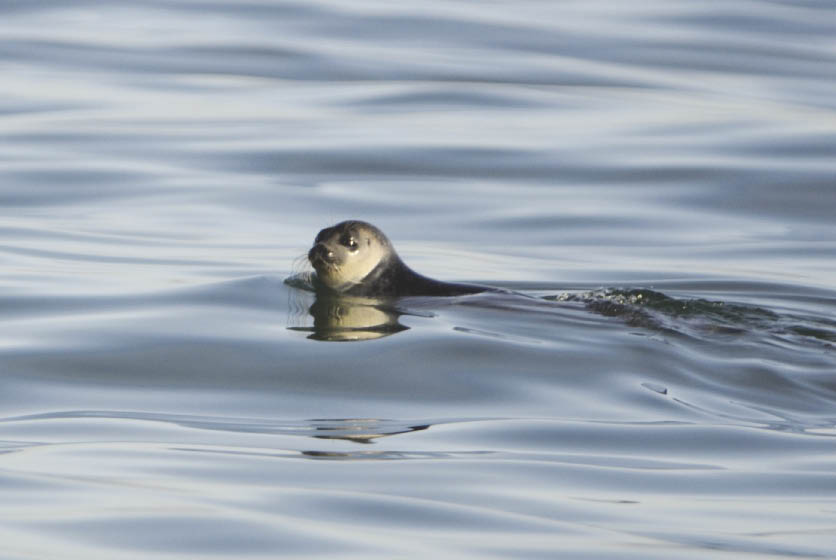DFO to consider listing ringed seals under Species at Risk Act
Community consultations slated to begin this fall
Although ringed seals are considered the most abundant marine mammal in the Canadian Arctic, the Department of Fisheries and Oceans Canada is considering listing them under the Species at Risk Act because of population declines expected to be caused by climate change. (Photo courtesy of Department of Fisheries and Oceans Canada)
The Department of Fisheries and Oceans will begin consultations with communities across the North this fall about whether to list ringed seals under the federal Species at Risk Act.
“If listed, there’s absolutely no restrictions or prohibitions, there’s no change to harvest,” said
Sam Stephenson, a species at risk biologist with DFO.
What it would mean, said Stephenson, is the department would work with northern groups to create a management plan.
It also means new funding.
“As soon as a species is listed or even when it’s considered for listing, it starts to open up the purse strings for different types of research,” says Stephenson.
The department’s community consultations follow a November 2019 decision by the Committee on the Status of Endangered Wildlife in Canada to list ringed seals as a species of special concern.
Although ringed seals are the most abundant marine mammal in the Canadian Arctic, climate warming factored into that decision.
“The Canadian population is predicted to decline over the next three generations and may become threatened due to extensive and ongoing changes in sea ice and snow cover in a rapidly warming Arctic,” said the committee’s summary.
One issue with ringed seals is that scientists have no idea what that population number is doing, says Stephenson.
“Scientific knowledge of ringed seal, not the traditional knowledge … remains quite poor,” said David Lee, a wildlife biologist with Nunavut Tunngavik Inc., during a recent quarterly Nunavut Wildlife Management Board meeting.
“The estimates of global range are from 2.5 million seals to six or even seven million seals.”
According to Lee, most of the discussion on whether to list the ringed seal as a species of special concern did not rely on traditional knowledge.
For some in attendance at the management board meeting, the issue was that the committee viewed all of the animals as one population, creating a potentially unfair assessment of the situation.
“What [this] does is potentially place populations where there aren’t issues with seal populations … in the same category as areas where there are issues with seal populations,” said Zoya Martin, director of the Government of Nunavut’s fisheries and sealing division, during the meeting.
Her concern is that this could create further challenges for those seeking to sell sealskin products.
According to Stephenson, the committee usually looks at genetic differences in animal populations to determine if there are subpopulations that could be listed separately. With ringed seals, that type of genetic information isn’t available.
“Perhaps with a management plan and increased funding and study, we may find that there are a few distinct populations,” he said.
Fisheries and Oceans aims to hold community consultations between September and December, but how those meetings will roll out has yet to be decided and depends on the status of the pandemic.






DFO plz tell polar bears and n killer whales not to hunt them too
Lol, is this a make -work project? Is this like detaining in anticipation of the crime?
No one said anything about penalizing anything. Logically, if DFO tells inuit(predators of the ringed seal) not to hunt them, they should tell the other predators, as well. Inuit do not even kill as many as their natural predators do. Although, big fishing companies who use trolling nets do. Possibly even more. Maybe the DFO needs to stop the big fishing companies that are known to damage the numbers and that bribe and are even known to be associated to onboard-researchers that go “missing”. Huge red flag on the DFO for ever allowing this to happen and never pursuing investigations to take place. Those are the people that need to be penalized. Not the predators who take bare minimum numbers off the seal.
I disagree with both of you, on this.
Shut up! We need more polar bears and killer whales so shut up
Agree with Julyta, please tell bears and killer whales no more hunting ringed seals
This is wrong.
Seals are the most abundant than almost any other animal in the world.
Why not feed each community instead for that funding give the money to hunters and feed there comunity.
If you don’t have reliable numbers and indicators, you do not have science. This is not based on good science. Yes, Polar Bears and Killer Whales are strong preditors of seals. Also watch out for bio toxins. DFO do not make policy on guess work.
This is a scheme to pump funding into “research”. I don’t oppose research, but we need to see this for what it is and be clear about what it is not–and it is not science.
DFO2021: we have seals, lots. We should protect them from climate change.
DFO2026: we still have lots of seals. Our policies working.
Inuit are under species at risk no housing sadly artifacts rather be housed then people
all of your comments are so right!!!!!!
Thanks
Once again DFO trying to create controversy just like they in the past with polar bears, whales, fish and now seals the most important part of our diet and a way of life but we shall prove them wrong again just like in the past.
Deep down most the DFO staff must be contributing to animal rights groups maybe because Inuit knowledge proved them wrong with their research and data.
DFO must have a personal agenda against Inuit and their knowledge about wildlife verses their knowledge with their researches.
Birthrights better step it up in backing Inuit on this one because it will take years to convince DFO otherwise just in the past.
Birthright corps better start doing their own research and gain data not from DFO.
The real reason for this designation:
“As soon as a species is listed or even when it’s considered for listing, it starts to open up the purse strings for different types of research,” says Stephenson.
There it is folks, an economic opportunity has been detected. Let the scientific masquerade begin.
The Scientific Masquerade would bring jobs for Inuit, equipment rental from Inuit. Look at the positives of the situation. If there are as many seals as traditional knowledge states then what’s to lose?
To me it seems the integrity of the DFO and the Species at Risk designation might be eroded if it can be so plainly admitted that this is really just a way to manipulate funding.
None of that is to say I am opposed to studying ring-seal or for more jobs and cash flow for Inuit communities; those are just two different things.
DFO protecting the big body that is the fisheries. Over fishing is a cause to anything that’s dying off these days and they shrug it under the rug with such words as “sustainable”. There is other marine life lost due to the mass amounts of fishing companies that should be held accountable for such losses. Close the mega bodies fisheries and watch those numbers of predators and prey go up astronomically. Watch the Netflix series and it’ll put a whole new perspective on how DFO is operating. They’re protecting mega corps and penalizing the population for the mess they, themselves, cause.